Upon taking office in early December, Alberto Fernández decided to shake up the structure of the national government. Among the changes was a move to upgrade the environment portfolio to a ministry, an area previously relegated to a secretariat by former president Mauricio Macri, the Peronist leader’s predecessor.
The man chosen for the job was Juan Cabandié, a human rights activist, founding member of La Cámpora and former lawmaker at both national and municipal level.
Cabandié has a deeply personal connection to the human rights movement. He was born in 1978 at the ex-ESMA Navy Mechanics School in Buenos Aires, a site that served as a clandestine detention and torture centre during the last military dictatorship.
His mother, Alicia, is one of the disappeared. After she was taken away by soldiers, Cabandié was given up to a family for adoption. It would be 25 years before he discovered his real identity.
In the years since, Cabandié has gone on to become an influential member of Vice-President Cristina Fernández de Kirchner’s political circle and served in both the National Congress and the Buenos Aires City legislature, before now taking his post as minister.
In an exclusive interview with the Times, Cabandié discussed the impact of the coronavirus pandemic and called for a new “social and environmental order,” questioning highly-polluting methods of production. Warming to the theme, he called on Peronism to embrace the fight against the culture of waste, rather than fighting capital.
With the global economy on pause, the coronavirus epidemic has brought about lower levels of pollution. Nevertheless, this will likely revert back once the economy gets back on track. How disruptive will this crisis be?
The fact that many species of animals can now be seen walking freely in cities, or that rivers have become more transparent can help us reflect, but it doesn’t solve the true problems. The day after the crisis can’t be the same as before.
There’s a push in some European countries and by some organisations in the United States for a green stimulus package that allows the economy to get back on track while reducing environmental impact. Is it possible to think of something like this for Argentina?
It’s something to consider. We have to aspire so that after the pandemic we can all move towards more sustainable practices, as the current ones are too old and polluting. The world is calling on us to do that. Argentina has a large part of its economy based on exporting commodities and Europe will soon start looking at the environmental footprint of them. Instead of earning money in the short-term and polluting ourselves, it would be smarter to think about a sustainable approach and obtain profits in the long-term.
Argentina’s economy relies on economic activities that have many social and environmental negative effects. Is it time to start thinking of an alternative economic model?
It will be logical for the world to discuss a new social and environmental order that contemplates new methods of production. It’s true that we need money to sustain our economy but the environment shouldn’t be seen as an obstacle to that, it’s part of the solution. The coronavirus crisis has accelerated this analysis and it should lead us to review current practices.
How fast can this change be done?
Changes take time but we shouldn’t stop changing. Every day we have to try to find improvements. It’s a challenge we have in society. There are areas in which we can find that level of change, but some sectors don’t seem to be willing to change their current way of doing things. They are only thinking of getting bigger and bigger profits.
Many countries are now working on transforming their economies completely, so they can stop generating polluting emissions. Will Argentina move in that direction?
Argentina signed the Paris Agreement and we have to meet the 2050 goal of carbon neutrality. The country has a climate pledge and we’ll improve it before the UN climate conference next year. To meet those objectives we have to lower our emissions and prevent deforestation continuing in our country.
In which areas can Argentina be more ambitious and reduce its emissions further?
We are working on preventing deforestation and increasing renewable energy. It would only be logical for the State to buy only hybrid or electric vehicles, for example. We have to do that right now. At the same time, it would be logical to stop clearing forests. We are making improvements on that, working with better satellite data and giving the provinces more funds. We have to review the Forest Law to improve the protection of the forests.
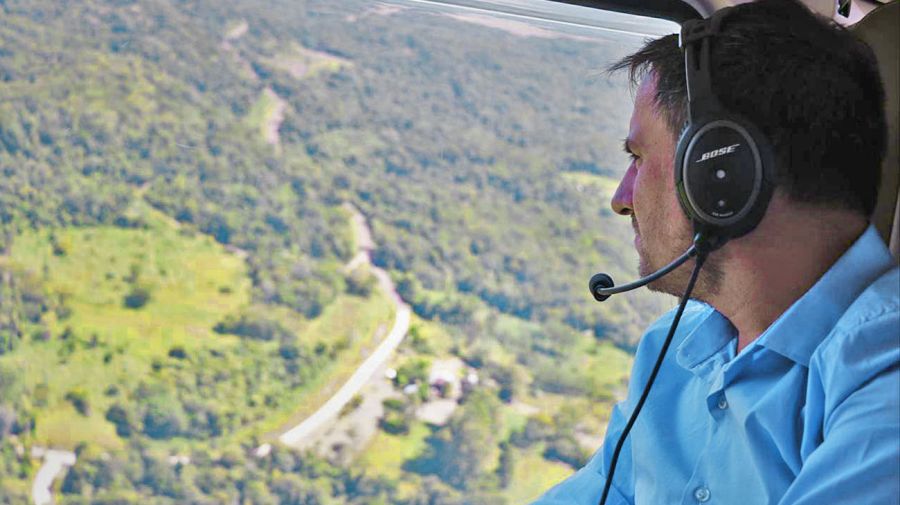
How would you describe levels of deforestation in Argentina?
When we took office, we noticed there wasn’t a good coordination between the national government and the environmental authorities of the provinces, which also weren’t receiving the appropriate funds to protect and monitor the forests. There was a significant delay in transfers [of funds]. Now we are correcting all that, closely working with the provinces.
You mentioned the idea of moving ahead with electric vehicles in Argentina. How can this be implemented?
We should move forward on this, both on hybrid and electric transportation. Each province manages their own transportation system, except in the metropolitan area, in which the national government controls some aspects.
On energy, Argentina has a law to increase renewable energy to 20 percent by 2025. Some projects have stalled now amid the economic context. How can the sector move forward and be more ambitious?
We should aspire to more renewables, it’s a priority issue. We have to continue with what was done with renewables during the previous administration but doing it better. Solar and wind energy sources are very important in Argentina. The State should set the example and that’s why we are planning for regiments to be powered by renewables.
One of the key issues for you at the ministry has been waste management. How would you describe the scenario in Argentina?
It’s a priority for us and an urgent issue, as we haven’t given sufficient importance to it so far. The number of landfills in the country is double the number of municipalities nationwide. We have a significant delay in the way we work with waste, both from the State and from society. We need to make changes in those two areas but we are the ones who have to start the process.
We are signing agreements with municipalities through which they commit to waste management practices, which will then be signed into local laws. The citizenry has a larger environmental awareness of environmental issues than politicians, that’s why we need their help to make things happen.
While waste management has to improve, should we also be thinking of reducing the amount of goods and services we consume?
That’s a big challenge, especially for a government such as ours. We have, in our philosophy, the idea of expanding the economy so to better distribute the income and grant more rights to the people. But now we have a big challenge, as we can’t do that at any cost. It’s a difficult issue for Peronism, expanding the economy but not at any cost. That’s where the new environmental and social order comes into play. The Peronist anthem says we have to fight capital – now the updated version should ask us to fight the culture of waste.
Consuming and discarding all the time leads to dissatisfaction and greater social inequality. But we also need an economy that works and has jobs. That’s why we should have a big discussion between all the sectors involved. We are facing a paradigm change. Society feels something is not working well and that’s wild capitalism.
And that same capitalism in many cases comes along with practices that pollute the environment...
They impact upon the environment because we produce goods and services massively and discard them very fast. And that waste then pollutes the environment. Capitalism produces goods that are discarded in a short period of time. That’s what’s called programmed obsolescence.
How can we then move away from highly polluting activities, such as the use of fossil fuels and the agriculture sector in Argentina, to other types of activities?
It’s a big discussion. The price of oil was near 100 dollars when there were perspectives of scarcity by producing countries. Then the US found shale and now there’s long-term perspectives because of fracking.
First, we have to prevent the environmental liabilities, such as the pools with chemicals waste we can now see in the Vaca Muerta area. It’s unbelievable that companies that are earning massive amounts of money with oil are leaving that behind. Big economic changes require time for analysis. But what we can’t do is stop analysing it.
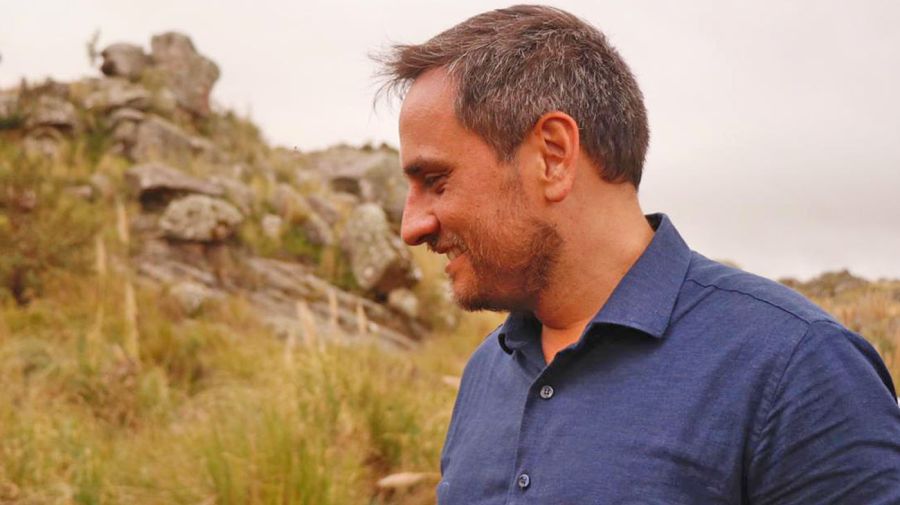
Such discussions also include the mining sector, with many mining spills in recent years in Argentina. Can the State have a stronger role to prevent that from happening?
The methods used in mining represent the essence of wild extractivism, not thinking of the people affected by them or the pollutants released to the environment.
We have to change such models. A mining company can’t extract minerals the same way as they did 250 years ago. Companies only think of obtaining profits. They come to countries like Argentina for a short window of time, take everything, leave a little money from taxes and pollute the environment.
Many years ago we could afford to waste water, it wasn’t such a big problem. But now large parts of the soil of Buenos Aires Province are facing drought, as are many other areas of the country.
That’s why experts are right, water is more important than gold. We might extract gold and obtain royalties from it but the water used for that is irreplaceable. Our mining law allows companies to take minerals without many restrictions. There have been attitudes by provinces to change practices and establish more controls, such as in San Juan province. But we can’t forget the issues with water use.
Another issue you have focused on since you took office is the use of chemicals on the agricultural sector, which it is alleged has led to many cases of cancer in people living in the areas nearby to the fields. Will the State take a more active role in moving to a different production model here?
It’s essential to have a larger agro-ecological production in Argentina. There are many chemicals being used now that damage our soil and our health. They can provide a better yield in the short term but not in the long one. We have to think of the desertification of the soils being produced because of this.
If many labs in the county could analyse the levels we all have of glyphosate in our blood, we would be shocked. Not only those who spray the chemicals are exposed to it, when you analyse the rain water you can see it has glyphosate. Companies made us believe that such chemicals were essential, when they are not. Without using them we can have even higher yields, depending on the crop.
The world is changing its practices and will look closer at the chemicals that were used in our beef, fruits and vegetables. They might even be banned from being sold to certain countries.
Last week many illegal fishing vessels were detained in Argentine waters. Will the State introduce stronger controls?
We need more infrastructure to control illegal fishing vessels. It’s something to review. We had worked for many years with the use of radar with local technology but during the last administration that was dismantled, due to pressures from other countries that wanted us to buy the radars from them. We have lost sovereignty during the last four years in many areas and that has had costs, including on fishing.
You have always been a strong human rights campaigner. How does that influence your work now on environmental issues?
I’m grateful to the president and to Néstor and Cristina Kirchner. My life experience linked to human rights took me to be present whenever there were just causes. The environment is a just cause, it’s a cause for humankind. To be thinking of rights is part of my lifestyle. We are now reflecting about human behaviour. We have to consider nature not only as resources and live in harmony with nature.








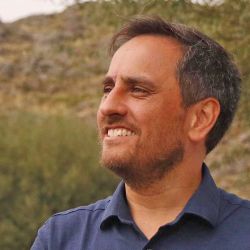


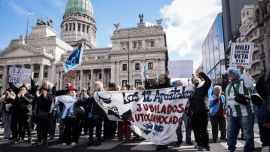







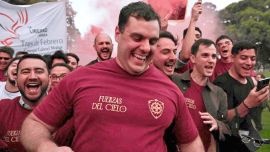



Comments